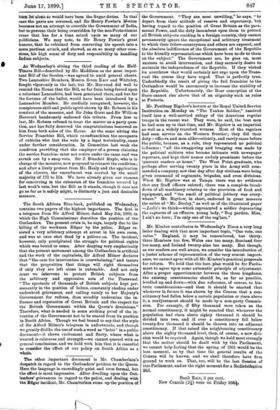The South African Blue-book, published on Wednesday, contains two papers
of the highest importance. The first is a telegram from Sir Alfred Milner, dated May 5th, 1899, in which the High Commissioner describes the position of the Outlanders. The present crisis is, he says, largely due to the killing of the workman Edgar by the police. Edgar re- sisted a very arbitrary attempt at arrest in his own room, and was at once shot dead by a policeman. The incident, however, only precipitated the struggle for political rights which was bound to come. After denying very emphatically that the present movement among the Outlanders is artificial and the work of the capitalists, Sir Alfred Milner declares that "the case for intervention is overwhelming," and insists that the proposition that things will right themselves if only they are left alone is untenable. And not only must we intervene to protect British subjects from the arbitrary and oppressive acts of the Transvaal. " The spectacle of thousands of British subjects kept per- manently in the position of helots, constantly chafing under undoubted grievances, and calling vainly to her Majesty's Government for redress, does steadily undermine the in- fluence and reputation of Great Britain and the respect for the British Government within the Queen's dominions." Therefore, what is needed is some striking proof of the in- tention of the Government not to be ousted from its position in South Africa. Though we feel bound to say that the style of Sir Alfred Milner's telegram is unfortunate, and though we greatly dislike the use of such a word as "helot" in a. public document—it shows excitement and flurry, where what is wanted is calmness and strength—we cannot quarrel with us general conclusions, and we hold with him that it is essential to consider the effect of our policy on South Africa as a whole.






































 Previous page
Previous page